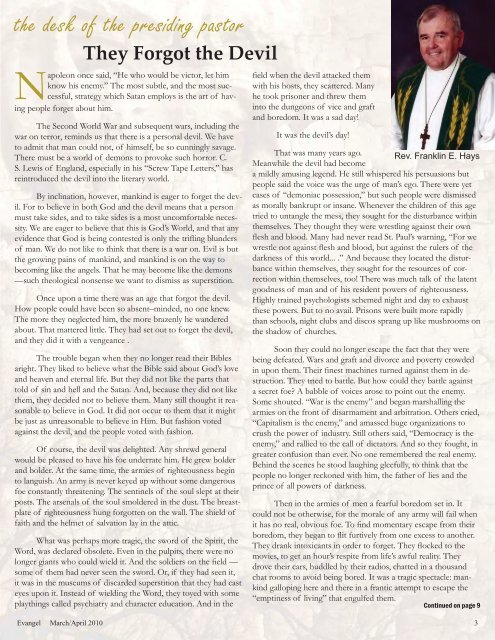March/April 2010 - The American Association of Lutheran Churches
March/April 2010 - The American Association of Lutheran Churches
March/April 2010 - The American Association of Lutheran Churches
Create successful ePaper yourself
Turn your PDF publications into a flip-book with our unique Google optimized e-Paper software.
the desk <strong>of</strong> the presiding pastor<strong>The</strong>y Forgot the DevilNapoleon once said, “He who would be victor, let himknow his enemy.” <strong>The</strong> most subtle, and the most successful,strategy which Satan employs is the art <strong>of</strong> havingpeople forget about him.<strong>The</strong> Second World War and subsequent wars, including thewar on terror, reminds us that there is a personal devil. We haveto admit that man could not, <strong>of</strong> himself, be so cunningly savage.<strong>The</strong>re must be a world <strong>of</strong> demons to provoke such horror. C.S. Lewis <strong>of</strong> England, especially in his “Screw Tape Letters,” hasreintroduced the devil into the literary world.By inclination, however, mankind is eager to forget the devil.For to believe in both God and the devil means that a personmust take sides, and to take sides is a most uncomfortable necessity.We are eager to believe that this is God’s World, and that anyevidence that God is being contested is only the trifling blunders<strong>of</strong> man. We do not like to think that there is a war on. Evil is butthe growing pains <strong>of</strong> mankind, and mankind is on the way tobecoming like the angels. That he may become like the demons—such theological nonsense we want to dismiss as superstition.Once upon a time there was an age that forgot the devil.How people could have been so absent–minded, no one knew.<strong>The</strong> more they neglected him, the more brazenly he wanderedabout. That mattered little. <strong>The</strong>y had set out to forget the devil,and they did it with a vengeance .<strong>The</strong> trouble began when they no longer read their Biblesaright. <strong>The</strong>y liked to believe what the Bible said about God’s loveand heaven and eternal life. But they did not like the parts thattold <strong>of</strong> sin and hell and the Satan. And, because they did not likethem, they decided not to believe them. Many still thought it reasonableto believe in God. It did not occur to them that it mightbe just as unreasonable to believe in Him. But fashion votedagainst the devil, and the people voted with fashion.Of course, the devil was delighted. Any shrewd generalwould be pleased to have his foe underrate him. He grew bolderand bolder. At the same time, the armies <strong>of</strong> righteousness beginto languish. An army is never keyed up without some dangerousfoe constantly threatening. <strong>The</strong> sentinels <strong>of</strong> the soul slept at theirposts. <strong>The</strong> arsenals <strong>of</strong> the soul smoldered in the dust. <strong>The</strong> breastplate<strong>of</strong> righteousness hung forgotten on the wall. <strong>The</strong> shield <strong>of</strong>faith and the helmet <strong>of</strong> salvation lay in the attic.What was perhaps more tragic, the sword <strong>of</strong> the Spirit, theWord, was declared obsolete. Even in the pulpits, there were nolonger giants who could wield it. And the soldiers on the field —some <strong>of</strong> them had never seen the sword. Or, if they had seen it,it was in the museums <strong>of</strong> discarded superstition that they had casteyes upon it. Instead <strong>of</strong> wielding the Word, they toyed with someplaythings called psychiatry and character education. And in thefield when the devil attacked themwith his hosts, they scattered. Manyhe took prisoner and threw theminto the dungeons <strong>of</strong> vice and graftand boredom. It was a sad day!It was the devil’s day!That was many years ago. Rev. Franklin E. HaysMeanwhile the devil had becomea mildly amusing legend. He still whispered his persuasions butpeople said the voice was the urge <strong>of</strong> man’s ego. <strong>The</strong>re were yetcases <strong>of</strong> “demoniac possession,” but such people were dismissedas morally bankrupt or insane. Whenever the children <strong>of</strong> this agetried to untangle the mess, they sought for the disturbance withinthemselves. <strong>The</strong>y thought they were wrestling against their ownflesh and blood. Many had never read St. Paul’s warning, “For wewrestle not against flesh and blood, but against the rulers <strong>of</strong> thedarkness <strong>of</strong> this world... .” And because they located the disturbancewithin themselves, they sought for the resources <strong>of</strong> correctionwithin themselves, too! <strong>The</strong>re was much talk <strong>of</strong> the latentgoodness <strong>of</strong> man and <strong>of</strong> his resident powers <strong>of</strong> righteousness.Highly trained psychologists schemed night and day to exhaustthese powers. But to no avail. Prisons were built more rapidlythan schools, night clubs and discos sprang up like mushrooms onthe shadow <strong>of</strong> churches.Soon they could no longer escape the fact that they werebeing defeated. Wars and graft and divorce and poverty crowdedin upon them. <strong>The</strong>ir finest machines turned against them in destruction.<strong>The</strong>y tried to battle. But how could they battle againsta secret foe? A babble <strong>of</strong> voices arose to point out the enemy.Some shouted. “War is the enemy” and began marshalling thearmies on the front <strong>of</strong> disarmament and arbitration. Others cried,“Capitalism is the enemy,” and amassed huge organizations tocrush the power <strong>of</strong> industry. Still others said, “Democracy is theenemy,” and rallied to the call <strong>of</strong> dictators. And so they fought, ingreater confusion than ever. No one remembered the real enemy.Behind the scenes he stood laughing gleefully, to think that thepeople no longer reckoned with him, the father <strong>of</strong> lies and theprince <strong>of</strong> all powers <strong>of</strong> darkness.<strong>The</strong>n in the armies <strong>of</strong> men a fearful boredom set in. Itcould not be otherwise, for the morale <strong>of</strong> any army will fail whenit has no real, obvious foe. To find momentary escape from theirboredom, they began to flit furtively from one excess to another.<strong>The</strong>y drank intoxicants in order to forget. <strong>The</strong>y flocked to themovies, to get an hour’s respite from life’s awful reality. <strong>The</strong>ydrove their cars, huddled by their radios, chatted in a thousandchat rooms to avoid being bored. It was a tragic spectacle: mankindgalloping here and there in a frantic attempt to escape the“emptiness <strong>of</strong> living” that engulfed them.Continued on page 9Evangel <strong>March</strong>/<strong>April</strong> <strong>2010</strong> 3




